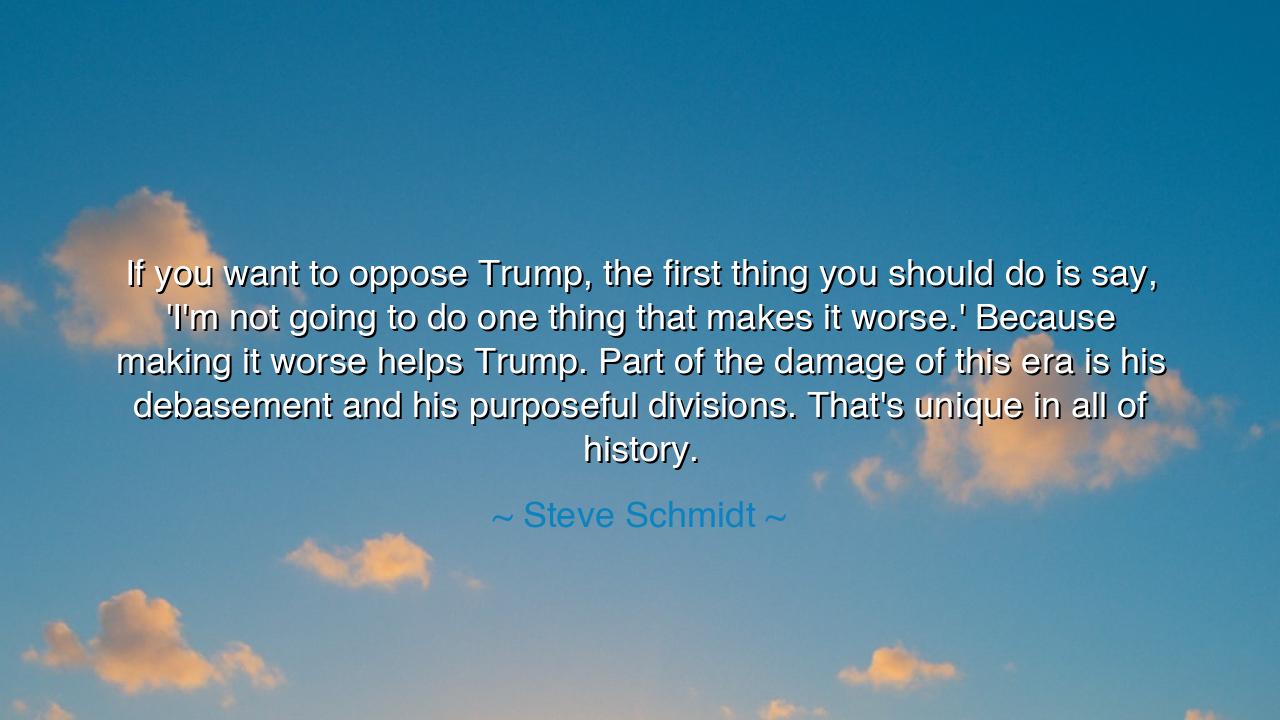
If you want to oppose Trump, the first thing you should do is
If you want to oppose Trump, the first thing you should do is say, 'I'm not going to do one thing that makes it worse.' Because making it worse helps Trump. Part of the damage of this era is his debasement and his purposeful divisions. That's unique in all of history.






“If you want to oppose Trump, the first thing you should do is say, ‘I'm not going to do one thing that makes it worse.’ Because making it worse helps Trump. Part of the damage of this era is his debasement and his purposeful divisions. That's unique in all of history.” Thus spoke Steve Schmidt, a strategist and truth-teller who, having once stood close to power, later turned against it in defense of conscience. His words are not bound to one man or moment—they speak to a universal truth of politics and morality: that in confronting corruption, hatred, or chaos, we must take care not to become what we oppose. The quote stands as a warning for all who live in times of division, when the fire of outrage threatens to consume both justice and judgment.
At its heart, Schmidt’s teaching is about discipline and restraint, virtues as old as civilization and as rare in moments of upheaval as calm seas in a storm. He reminds us that righteous anger, if untamed, can serve the very darkness it seeks to destroy. To “not make it worse” is not a call to silence—it is a call to wisdom, to act not from fury but from principle. The tyrant thrives on chaos, feeds on outrage, and grows stronger from every act of recklessness committed by his opponents. Thus, Schmidt’s insight is a weapon forged not of wrath, but of clarity: to fight division, one must refuse to become a divider; to restore honor, one must guard against the temptation to dishonor.
This truth has echoed through the ages. Consider the fall of the Roman Republic, when political factions, each claiming virtue, mirrored one another in violence and deceit. Men like Cato and Cicero, once defenders of order, found themselves entangled in the same rage and ambition that destroyed their enemies. In their efforts to preserve Rome, they helped unravel her from within. The republic did not die solely from the hand of Caesar, but from the poison of polarization, where every man believed himself righteous and every compromise a betrayal. Schmidt’s words call us back from that precipice: to remember that in the battle for a nation’s soul, the manner of our fight matters as much as the cause itself.
When he speaks of “debasement” and “purposeful divisions,” Schmidt points to the deliberate corrosion of dignity in public life. To debase something is to strip it of its sacred worth—to mock truth, to cheapen justice, to reduce the noble to spectacle. And indeed, this has been the tactic of many tyrants through history: to sow cynicism so deep that people cease to believe in virtue altogether. Once honor is mocked, and truth treated as a game, the strongman reigns unchallenged—not by persuasion, but by exhaustion. Against this, Schmidt offers the antidote of restraint, integrity, and civility. The true opponent of corruption does not descend into the mud, for to do so is to yield the high ground forever.
Let us look also to the example of Nelson Mandela, who, after twenty-seven years of imprisonment, emerged not with vengeance, but with grace. His oppressors had sought to make him bitter, to turn his righteousness into hatred. Yet he refused. “Resentment,” he said, “is like drinking poison and hoping it will kill your enemies.” In this spirit, Mandela did not “make it worse.” He healed what division had torn apart. His triumph was not merely political—it was moral, born from the strength to resist the easy path of anger. He understood, as Schmidt now teaches, that true leadership restores what tyranny divides.
In saying that this “era is unique in all of history,” Schmidt speaks not of ego, but of warning. For never before have tools of division—media, technology, global reach—been so vast, nor truth so fragile. A single word, broadcast without thought, can set millions ablaze. Thus, the responsibility of the individual grows greater than ever. Every person must ask themselves: “Am I calming the storm, or feeding it?” The modern struggle is not only against a leader or ideology—it is against the spirit of division itself, that ancient serpent that thrives on human weakness and pride.
The lesson, then, is clear: if you would heal a broken time, begin with yourself. Refuse to contribute to the decay you condemn. Speak truth, but not hatred; act firmly, but not cruelly. To oppose corruption, be incorruptible. To oppose cruelty, be kind. To oppose falsehood, be honest even when it costs you. This is not weakness—it is the deepest strength, for it resists not only the enemy without, but the darkness within.
So let Schmidt’s words stand as a guiding flame for all who live in divisive times: Do nothing that makes it worse. Let your opposition to evil be pure, your purpose steady, and your soul untainted by the chaos around you. For the test of every age is not whether we win our battles, but whether we preserve our humanity in fighting them. The tyrant may fall by the sword, but the soul of a people is saved only by wisdom, restraint, and courage born of conscience.






AAdministratorAdministrator
Welcome, honored guests. Please leave a comment, we will respond soon